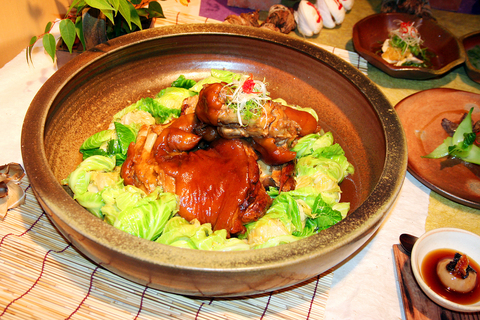"Nouveau Taiwanese cuisine" is a label that was going to stick sometime. Now that it has you can sample traditional and reinvented Hakka dishes by prize-winning chef Robin Lin (林祺豐) at the Shang Palace in the Far Eastern Plaza Hotel (台北遠東國際大飯店). The former mechanical engineering and Chinese cuisine graduate combines attention to detail and a love of food and country.
The result is a piquant and earthy style of cooking that uses local ingredients, such as clams, salty pork, Chinese cabbage, preserved turnip, intestines and fruits of the sea. Lin uses these staple foods to develop "new Taiwanese" recipes based on old formulas.
The Hakka, or "guest people," were originally from northern China, around 1,700 years ago, but settled in the south and then moved outward in a series of diasporas. Most Taiwanese Hakka settled in hilly or remote areas and typically were poor and dependant on farming. As a result their food was often preserved with salt or by pickling, in order to make the most of their seasonal harvests. It was also occasionally oily as this provided much-needed energy.

PHOTO: JULES QUARTLY, TAIPEI TIMES
This was evident in dishes such as the salty pork with preserved turnip and the spicy, salted deep-fried bomb fish. Like spice in an Indian curry or the seasoning originally used by French chefs to disguise indifferent ingredients, Taiwanese fare has evolved its own set of flavors. Preserved been curd sauce is a key element in many of the dishes and has a strong taste that would have originally given bland food some interest.
"Hakka food is generally considered to be common. Here we are making it more cultured and sophisticated so that diners can appreciate the real Hakka spirit. It is food that was originally for poor people but actually it is now considered to be good for the health and natural," Lin said.
An example of this was the clam with fried rice, wrapped with cabbage that came garnished with seaweed. The gently seasoned seaweed and clams went together perfectly and Lin explained choosing elements that complemented each other was a signature of his dishes.
Lin, who won a Hakka cuisine championship in 2005, is head chef at the renowned Hwataoyao (華陶窯) restaurant, botanical garden and ceramic studio in Miaoli County (苗栗縣). For this weeklong promotion at the Far Eastern, Lin will assist the hotel's chefs in providing nouveau Taiwanese cuisine, for the first time.

The primaries for this year’s nine-in-one local elections in November began early in this election cycle, starting last autumn. The local press has been full of tales of intrigue, betrayal, infighting and drama going back to the summer of 2024. This is not widely covered in the English-language press, and the nine-in-one elections are not well understood. The nine-in-one elections refer to the nine levels of local governments that go to the ballot, from the neighborhood and village borough chief level on up to the city mayor and county commissioner level. The main focus is on the 22 special municipality

The People’s Republic of China (PRC) invaded Vietnam in 1979, following a year of increasingly tense relations between the two states. Beijing viewed Vietnam’s close relations with Soviet Russia as a threat. One of the pretexts it used was the alleged mistreatment of the ethnic Chinese in Vietnam. Tension between the ethnic Chinese and governments in Vietnam had been ongoing for decades. The French used to play off the Vietnamese against the Chinese as a divide-and-rule strategy. The Saigon government in 1956 compelled all Vietnam-born Chinese to adopt Vietnamese citizenship. It also banned them from 11 trades they had previously

In the 2010s, the Communist Party of China (CCP) began cracking down on Christian churches. Media reports said at the time that various versions of Protestant Christianity were likely the fastest growing religions in the People’s Republic of China (PRC). The crackdown was part of a campaign that in turn was part of a larger movement to bring religion under party control. For the Protestant churches, “the government’s aim has been to force all churches into the state-controlled organization,” according to a 2023 article in Christianity Today. That piece was centered on Wang Yi (王怡), the fiery, charismatic pastor of the

Hsu Pu-liao (許不了) never lived to see the premiere of his most successful film, The Clown and the Swan (小丑與天鵝, 1985). The movie, which starred Hsu, the “Taiwanese Charlie Chaplin,” outgrossed Jackie Chan’s Heart of Dragon (龍的心), earning NT$9.2 million at the local box office. Forty years after its premiere, the film has become the Taiwan Film and Audiovisual Institute’s (TFAI) 100th restoration. “It is the only one of Hsu’s films whose original negative survived,” says director Kevin Chu (朱延平), one of Taiwan’s most commercially successful